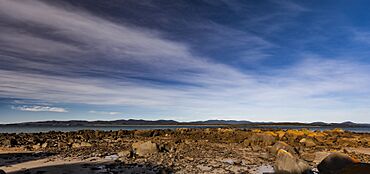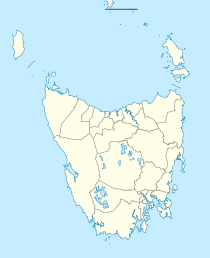Hawley Beach facts for kids
Quick facts for kids Hawley BeachTasmania |
|||||||||||||||
|---|---|---|---|---|---|---|---|---|---|---|---|---|---|---|---|

Hawley in 2016
|
|||||||||||||||
| Population | 484 (2016 census) | ||||||||||||||
| Postcode(s) | 7307 | ||||||||||||||
| Location |
|
||||||||||||||
| LGA(s) | Latrobe | ||||||||||||||
| Region | North-west and west | ||||||||||||||
| State electorate(s) | Braddon | ||||||||||||||
| Federal Division(s) | Braddon | ||||||||||||||
|
|||||||||||||||
Hawley Beach is a lovely coastal spot in Tasmania, Australia. It's a mix of quiet countryside and homes near the sea. This area is part of the Latrobe region, located in the north-west of the state.
Hawley Beach is about 22 kilometers (14 miles) north-east of the town of Latrobe. In 2016, a count of people living there showed a population of 484. It's also a popular seaside resort town. The closest main town is Devonport, which is also 22 kilometers away. Nearby, you'll find the small town of Port Sorell and the area called Shearwater.
Contents
Nature and Wildlife at Hawley Beach
Hawley Beach is a great place for nature lovers. You can find tiny red sand crabs here. It's also home to special birds like the hooded plover. Many people enjoy fishing in the waters nearby.
The Rubicon Estuary: A Bird Paradise
Hawley Beach is right next to the Rubicon Estuary. An estuary is where a river meets the sea. This estuary is very important for birds. It has been named an "Important Bird Area" by BirdLife International. This means it's a crucial spot for many types of birds, especially waders. Waders are birds that walk through shallow water to find food. A common wader you might see here is the pied oystercatcher.
History of Hawley Beach
Hawley Beach has been an official locality since 1955. A post office opened here on November 2, 1965. It served the community for many years before closing in 1992.
Geography and Location
The beautiful waters of Bass Strait surround Hawley Beach. Bass Strait forms part of the western edge of the area. It also makes up all of the northern and eastern boundaries. This means Hawley Beach has a lot of coastline.
Getting Around Hawley Beach
If you want to visit Hawley Beach, you can use Route C708. This road is also known as Alexander Street. It leads right into the area, ending at its southern border.
 | Kyle Baker |
 | Joseph Yoakum |
 | Laura Wheeler Waring |
 | Henry Ossawa Tanner |


